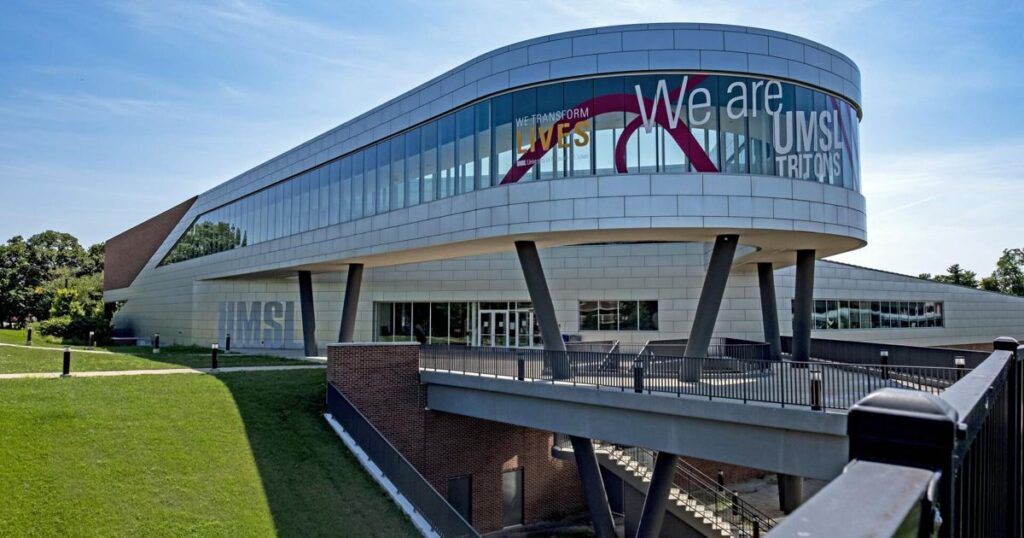
<span class="caption-text"> <p>UMSL Wellness and Recreation Center.</p> </span> <span class="credit"> <span id="author--asset-2157cf40-f46e-11ea-aab5-8be7fb9052db" class="tnt-byline asset-byline" > University of Missouri-St. Louis </span> </span> <span class="clearfix"></span>
There’s a longstanding tradition of excellence at our nation’s land-grant universities. But as we look to the future of higher education, the impact of urban and metropolitan universities is becoming increasingly vital. These institutions serve our most populous regions, providing affordable access to high-quality education and meeting the needs of diverse communities.
As board chair of the Coalition of Urban and Metropolitan Universities, I’m proud to represent the University of Missouri–St. Louis on the national stage as we engage and empower more than 120 urban universities across the country. Every day, these universities are making strides in their communities, driving social mobility, fostering innovation and developing the workforce our regions and states need to thrive.
Here at UMSL — which is now in its 61st year — we’re leaning into our role as a workforce driver for Missouri’s most populous and economically vital region. Over the past several years, we’ve launched innovative degree and certificate programs in high-demand areas like geospatial technology, supply chain analytics, cybersecurity, FinTech, and more. But perhaps the most exciting initiative shaping our future is the launch of a new UMSL School of Engineering.
People are also reading…
It’s rare to see a new School of Engineering established, particularly at an urban university like UMSL. But this is a direct response to a call from our region’s leading companies to meet the critical need for more engineering graduates. While UMSL currently offers ABET-accredited engineering degrees through a joint partnership with fellow CUMU member WashU, this expansion will allow us to serve more students, build state-of-the-art facilities on our campus and prepare the engineers our region desperately needs.
This ambitious project is already supported by key investments. The State of Missouri provided an initial $15 million in funding for the planning, design and construction of labs, classrooms and community spaces. We recently announced an additional $8 million gift from the James S. McDonnell Foundation to further advance this transformative initiative. These investments are just the beginning of what will be a landmark project for UMSL and our state.
But UMSL’s impact extends far beyond any single initiative. We are consistently ranked No. 1 in Missouri and among the top 100 universities nationally for advancing social mobility. This means we’re not just educating students; we’re transforming lives. More than 45% of UMSL students are Pell Grant-eligible with most grants awarded to students with a total family income below $20,000. Yet, they graduate with the skills and credentials that lead to jobs paying nearly $60,000 a year on average. That’s life-changing economic mobility — not just for individuals but for entire families and communities.
Jason Purnell, president of the James S. McDonnell Foundation, expressed it best when he announced their support for the UMSL School of Engineering, saying, “We understand that economic mobility and inclusive economic growth isn’t going to happen on autopilot. It’s going to need scaffolding and infrastructure, and this investment is a down payment on the infrastructure necessary to make sure that people can succeed, and that the region succeeds as a result.”
These investments in UMSL’s future underscore our commitment to serving St. Louis and Missouri. We are advancing a $110 million campus transformation, consolidating academics on our North Campus and creating the North St. Louis County Business and Workforce District on the South Campus. Highlights include a new Nursing Simulation Lab, expanded Patient Care Center for optometry education, virtual reality and geospatial labs, enhanced Children’s Advocacy Services, and upcoming projects like the Richter Family Welcome and Alumni Center, renovation of the libraries, and a new home for the College of Education and Honors College.
As a premier Tier-1 public research university, the University of Missouri–St. Louis is committed to being the problem solver, convener and workforce developer our region needs. With the collaboration of state leaders, regional partners and supporters across the board, we are building a future where inclusive prosperity and progress are within reach for all, ensuring UMSL remains a driving force for innovation, opportunity and growth that remains grounded in what our region needs to succeed and thrive.
Sobolik is chancellor of the University of Missouri–St. Louis



